- Home
- Dave Pelzer
A Child Called It: One Child's Courage to Survive
A Child Called It: One Child's Courage to Survive Read online
“A Child Called ‘It’ is a heart-stopping, compelling book. It is one of the most important books of our time and a ‘must read’ for anyone who searches for the secret of internal motivation.”
Vicki Binninger, Executive Director
Parents’ Place
A California Child Abuse Prevention,
Intervention and Treatment Center
“ Once this book was in my hands, I couldn’t put it down. This is the best book on the subject of child abuse I have ever read. As the reader moves with David through fear, loss, isolation, pain and rage to eventual hope, the dark world of the abused child becomes painfully clear. We become aware of the child’s cry through David’s eyes, ears and body. A Child Called ‘It’ made me want to hold my family close to my heart and cherish our love.”
Valerie Bivens, Social Worker
Child Protective Services
The State of California
“ Dave Pelzer’s child experience is a testimony to the triumph of the human spirit. This book vividly articulates the abuse he suffered at the hands of his mother and the unbelievable apathy of others to his plight. Pelzer’s courage and determination will go a long way in helping the millions of children in America who, too often, suffer every day in silence.”
Mark Riley
Child Welfare League of America
“ Everything began to point to one thing: this kid was being beaten and punished far beyond normal parental practice.”
Steven E. Ziegler, Teacher
Daly City, California
“In my 31 years of teaching, David Pelzer was the most severely abused child I have known.”
Athena Konstan, Teacher
Daly City, California
“To know the torment of abuse and how one child willed himself to survive, read this compelling, spellbinding account. One can only hope it will help us focus on stopping abuse before it occurs.”
Anne Cohn-Donnelly
National Committee for Prevention of Child Abuse
“David Pelzer is a triumphant survivor of his childhood abuse. David’s story will help people understand that each year hundreds of thousands of helpless children are being brutalized and tortured.”
Glenn A. Goldberg, former Executive Director
California Consortium
for the Prevention of Child Abuse
A Child
Called “It”
One Child’s Courage
to Survive
Dave Pelzer
Health Communications, Inc.
Deerfield Beach, Florida
www.hcibooks.com
Permission to reprint I Never Knew was given by Cindy Adams.
Library of Congress Cataloging-in-Publication Data
Pelzer, David J.
A child called “it”: one child’s courage to survive
/ David J. Pelzer.
p. cm.
Originally published: Omaha, Neb.: Omaha Press
Pub. Co., 1993.
ISBN-13: 978-1-55874-366-3 (trade paper)
ISBN-10: 1-55874-366-9 (trade paper)
1. Pelzer, David J. 2. Abused children--California--Daly City--Biography. 3. Children of alcoholics--California--Daly City--Family relationships. 5. Family violence--California-Daly City. 6. Foster home care--California. I. Title.
HV883.C2P45 1995
362.7’6’092--dc20 95-20792
[B] CIP
©1995 Dave Pelzer
All rights reserved. Printed in the United States of America. No part of this publication may be reproduced, stored in a retrieval system or transmitted in any form or by any means, electronic, mechanical, photocopying, recording or otherwise without the written permission of the publisher.
Publisher: Health Communications, Inc.
3201 S.W. 15th Street
Deerfield Beach, Florida 33442-8190
R-11-06
Cover design by Ileana M. Wainwright
This book is dedicated to my son Stephen,
who, by the grace of God, has taught me
the gift of love and joy through
the eyes of a child.
This book is also dedicated to
the teachers and staff members of
Thomas Edison Elementary School to include:
Steven E. Ziegler
Athena Konstan
Peter Hansen
Joyce Woodworth
Janice Woods
Betty Howell
and the School Nurse
To all of you, for your courage and for
putting your careers on the line
that fateful day, March 5, 1973.
You saved my life.
Contents
Acknowledgments
Author’s Notes
1. The Rescue
2. Good Times
3. Bad Boy
4. The Fight for Food
5. The Accident
6. While Father Is Away
7. The Lord’s Prayer
Epilogue
Perspectives on Child Abuse
Resources for Help
Acknowledgments
After years of intensive labor, sacrifice, frustration, compromises and deception, this book is finally published and available in bookstores everywhere. I wish to take a moment and pay homage to those who truly believed in this crusade.
To Jack Canfield, co-author of the phenomenal bestseller Chicken Soup for the Soul, for his extreme kindness and opening a big door. Jack is indeed a rare entity who, without reservation, assists more individuals in a single day than many of us can help in a lifetime. Bless you Sir.
To Nancy Mitchell and Kim Wiele at the Canfield Group for their enormous enthusiasm and guidance. Thank you ladies.
To Peter Vegso at Health Communications, Inc., as well as Christine Belleris, Matthew Diener, Kim Weiss and the entire friendly staff at HCI for their honesty, professionalism and everyday courtesy that make publishing a pleasure. Kudos galore to Irene Xanthos and Lori Golden for their tenacious drive and for picking up the slack. And a gargantuan thank you to the Art Department for all your hard work and dedication.
A special thank you to Marsha Donohoe, editor extraordinaire, for her hours of reediting and eradicating “the Wahoo” out of the tome, (that’s book for those of you who reside in Yuba/Sutter Counties in Northern CA) so to provide the reader with a clear, precise sense of this story through the eyes of a child. For Marsha, it was a matter of “. . . Farmer’s Trust.”
To Patti Breitman, of Breitman Publishing Projects, for her initial work and for giving it a good run for the money.
To Cindy Adams for her unwavering faith when I needed it the most.
A special thank you to Ric & Don at the Rio Villa Resort, my then home away from home, for providing the perfect sanctuary during the process of this project.
And lastly, to Phyllis Colleen. I wish you happiness. I wish you peace. May God bless you.
Author’s Notes
Some of the names in this book have been changed in order to maintain the dignity and privacy of others.
This book, the first part of the trilogy, depicts language that was developed from a child’s viewpoint. The tone and vocabulary reflect the age and wisdom of the child at that particular time.
This book is based on the child’s life from ages 4 to 12.
The second part of the trilogy, The Lost Boy, is based on his life from ages 12 to 18.
CHAPTER
1
The
Rescue
M arch 5, 1973, Daly City, California— I’m late. I’ve got to finish the dishes on time, otherwise no breakfast; and since I didn’t have
dinner last night, I have to make sure I get something to eat. Mother’s running around yelling at my brothers. I can hear her stomping down the hallway towards the kitchen. I dip my hands back into the scalding rinse water. It’s too late. She catches me with my hands out of the water.
SMACK! Mother hits me in the face, and I topple to the floor. I know better than to stand there and take the hit. I learned the hard way that she takes that as an act of defiance, which means more hits, or worst of all, no food. I regain my posture and dodge her looks, as she screams into my ears.
I act timid, nodding to her threats. “Please,” I say to myself, “just let me eat. Hit me again, but I have to have food.” Another blow pushes my head against the tile counter top. I let the tears of mock defeat stream down my face as she storms out of the kitchen, seemingly satisfied with herself. After I count her steps, making sure she’s gone, I breathe a sigh of relief. The act worked. Mother can beat me all she wants, but I haven’t let her take away my will to somehow survive.
I finish the dishes, then my other chores. For my reward I receive breakfast—leftovers from one of my brother’s cereal bowls. Today it’s Lucky Charms. There are only a few bits of cereal left in a half of a bowl of milk, but as quickly as I can, I swallow it before Mother changes her mind. She has done that before. Mother enjoys using food as her weapon. She knows better than to throw leftovers in the garbage can. She knows I’ll dig it out later. Mother knows most of my tricks.
Minutes later I’m in the old family station wagon. Because I’m so late with my chores, I have to be driven to school. Usually I run to school, arriving just as class begins, with no time to steal any food from other kids’ lunch boxes.
Mother drops my oldest brother off, but keeps me for a lecture about her plans for me tomorrow. She is going to take me to her brother’s house. She says Uncle Dan will “take care of me.” She makes it a threat. I give her a frightened look as if I am truly afraid. But I know that even though my uncle is a hard-nosed man, he surely won’t treat me like Mother does.
Before the station wagon comes to a complete stop, I dash out of the car. Mother yells for me to return. I have forgotten my crumpled lunch bag, which has always had the same menu for the last three years—two peanut butter sandwiches and a few carrot sticks. Before I bolt out of the car again, she says, “Tell ‘em . . . Tell ‘em you ran into the door.” Then in a voice she rarely uses with me, she states, “Have a nice day.” I look into her swollen red eyes. She still has a hangover from last night’s stupor. Her once beautiful, shiny hair is now frazzled clumps. As usual, she wears no makeup. She is overweight, and she knows it. In all, this has become Mother’s typical look.
Because I am so late, I have to report to the administrative office. The gray-haired secretary greets me with a smile. Moments later, the school nurse comes out and leads me into her office, where we go through the normal routine. First, she examines my face and arms. “What’s that above your eye?” she asks.
I nod sheepishly, “Oh, I ran into the hall door . . . by accident.”
Again she smiles and takes a clipboard from the top of a cabinet. She flips though a page or two, then bends down to show me. “Here,” she points to the paper, “You said that last Monday. Remember?”
I quickly change my story, “I was playing baseball and got hit by the bat. It was an accident.” Accident. I am always supposed to say that. But the nurse knows better. She scolds me so I’ll tell the truth. I always break down in the end and confess, even though I feel I should protect my mother.
The nurse tells me that I’ll be fine and asks me to take off my clothes. We have been doing this since last year, so I immediately obey. My long-sleeve shirt has more holes than Swiss cheese. It’s the same shirt I’ve worn for about two years. Mother has me wear it every day as her way to humiliate me. My pants are just as bad, and my shoes have holes in the toes. I can wiggle my big toe out of one of them. While I stand clothed only in my underwear, the nurse records my various marks and bruises on the clipboard. She counts the slash-like marks on my face, looking for any she might have missed in the past. She is very thorough. Next, the nurse opens my mouth to look at my teeth that are chipped from having been slammed against the kitchen tile counter top. She jots a few more notes on the paper. As she continues to look me over, she stops at the old scar on my stomach. “And that,” she says as she takes a deep swallow, “is where she stabbed you?”
“Yes, ma’am,” I reply. “Oh no!” I tell myself, “I’ve done something wrong . . . again.” The nurse must have seen the concern in my eyes. She puts the clipboard down and hugs me. “God,” I tell myself, “She is so warm.” I don’t want to let go. I want to stay in her arms forever. I hold my eyes tightly shut, and for a few moments nothing else exists. She pats my head. I flinch from the swollen bruise Mother gave me this morning. The nurse then breaks the embrace and leaves the room. I rush to put my clothes back on. She doesn’t know it, but I do everything as fast as possible.
The nurse returns in a few minutes with Mr. Hansen the principal, and two of my teachers, Miss Woods and Mr. Ziegler. Mr. Hansen knows me very well. I’ve been in his office more than any other kid in school. He looks at the paper, as the nurse reports her findings. He lifts my chin. I’m afraid to look into his eyes, which is mostly a habit from trying to deal with my mother. But it’s also because I don’t want to tell him anything. Once, about a year ago, he called Mother to ask about my bruises. At that time, he had no idea what was really going on. He just knew I was a troubled kid who was stealing food. When I came to school the next day, he saw the results of Mother’s beatings. He never called her again.
Mr. Hansen barks he’s had enough of this. I almost leap out of my skin with fear. “He’s going to call Mother again!” my brain screams. I break down and cry. My body shakes like jello and I mumble like a baby, begging Mr. Hansen not to phone Mother. “Please!” I whine, “Not today! Don’t you understand, it’s Friday?”
Mr. Hansen assures me he’s not going to call Mother, and sends me off to class. Since it’s too late for homeroom class, I sprint directly to Mrs. Woodworth’s English class. Today’s a spelling test on all the states and their capitals. I’m not prepared. Usually I’m a very good student, but for the past few months I gave up on everything in my life, including escaping my misery through my schoolwork.
Upon entering the room, all the students plug their noses and hiss at me. The substitute teacher, a younger woman, waves her hands in front of her face. She’s not used to my smell. At arm’s length she hands my test to me, but before I can take my seat in the back of the class by an open window, I’m summoned back to the principal’s office. The entire room lets out a howl at me—the reject of the fifth grade.
I run to the administration office, and I’m there in a flash. My throat is raw and still burns from yesterday’s “game” Mother played against me. The secretary leads me into the teachers’ lounge. After she opens the door, it takes a moment for my eyes to adjust. In front of me, sitting around a table, are my homeroom teacher Mr. Ziegler, my math teacher Miss Moss, the school nurse, Mr. Hansen and a police officer. My feet become frozen. I don’t know whether to run away or wait for the roof to cave in. Mr. Hansen waves me in, as the secretary closes the door behind me. I take a seat at the head of the table, explaining I didn’t steal anything . . . today. Smiles break everyone’s depressed frowns. I have no idea that they are about to risk their jobs to save me.
The police officer explains why Mr. Hansen called him. I can feel myself shrink into the chair. The officer asks that I tell him about Mother. I shake my head no. Too many people already know the secret, and I know she’ll find out. A soft voice calms me. I think it’s Miss Moss. She tells me it’s all right. I take a deep breath, wring my hands and reluctantly tell them about Mother and me. Then the nurse has me stand up and show the policeman the scar on my chest. Without hesitation, I tell them it was an accident; which it was—Mother never meant to stab me. I cry as I spill my guts, tellin
g them Mother punishes me because I am bad. I wish they would leave me alone. I feel so slimy inside. I know after all these years there is nothing anyone can do.
A few minutes later, I am excused to sit in the outer office. As I close the door, all the adults look at me and shake their heads in an approving way. I fidget in my chair, watching the secretary type papers. It seems forever before Mr. Hansen calls me back into the room. Miss Woods and Mr. Ziegler leave the lounge. They seem happy, but at the same time worried. Miss Woods kneels down and wraps me in her arms. I don’t think I will ever forget the smell of the perfume in her hair. She lets go, turning away so I won’t see her cry. Now I am really worried. Mr. Hansen gives me a lunch tray from the cafeteria. “My God! Is it lunch time already?” I ask myself.
I gobble down the food so fast I can hardly taste it. I finish the tray in record time. Soon the principal returns with a box of cookies, warning me not to eat so fast. I have no idea what’s going on. One of my guesses is that my father, who is separated from my mother, has come to get me. But I know it’s a fantasy. The policeman asks for my address and telephone number. “That’s it!” I tell myself. “It’s back to hell! I’m going to get it from her again!”
The officer writes down more notes as Mr. Hansen and the school nurse look on. Soon he closes his note pad and tells Mr. Hansen that he has enough information. I look up at the principal. His face is covered with sweat. I can feel my stomach start to coil. I want to go to the bathroom and throw up.
Mr. Hansen opens the door, and I can see all the teachers on their lunch break staring at me. I’m so ashamed. “They know,” I tell myself. “They know the truth about my mother; the real truth.” It is so important for them to know that I’m not a bad boy. I want so much to be liked, to be loved. I turn down the hall. Mr. Ziegler is holding Miss Woods. She is crying. I can hear her sniffle. She gives me another hug and quickly turns away. Mr. Ziegler shakes my hand. “Be a good boy,” he says.

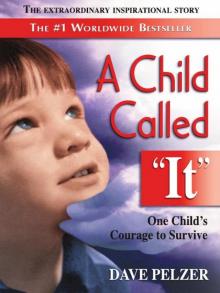 A Child Called It: One Child's Courage to Survive
A Child Called It: One Child's Courage to Survive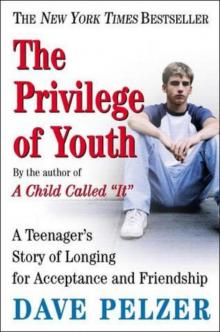 The Privilege of Youth: A Teenager's Story
The Privilege of Youth: A Teenager's Story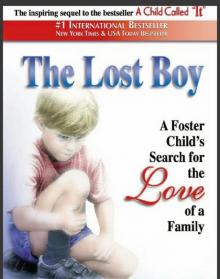 The Lost Boy: A Foster Child's Search for the Love of a Family
The Lost Boy: A Foster Child's Search for the Love of a Family A Man Named Dave
A Man Named Dave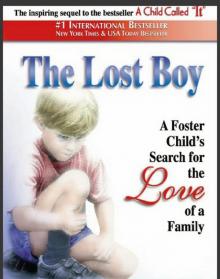 The Lost Boy
The Lost Boy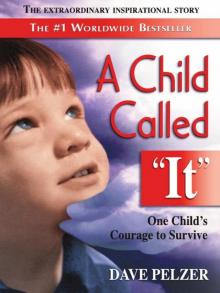 A Child Called It
A Child Called It